
Sir John Falstaff is a fictional character who appears in three plays by William Shakespeare and is eulogised in a fourth. His significance as a fully developed character is primarily formed in the plays Henry IV, Part 1 and Part 2, where he is a companion to Prince Hal, the future King Henry V of England. Falstaff is also featured as the buffoonish suitor of two married women in The Merry Wives of Windsor. Though primarily a comic figure, he embodies a depth common to Shakespeare's major characters. A fat, vain, and boastful knight, he spends most of his time drinking at the Boar's Head Inn with petty criminals, living on stolen or borrowed money. Falstaff leads the apparently wayward Prince Hal into trouble, and is repudiated when Hal becomes king.

Great Court is the main court of Trinity College, Cambridge, and reputed to be the largest enclosed courtyard in Europe.
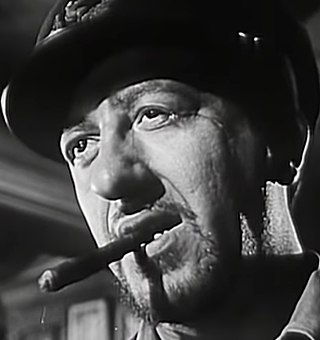
Henry Corden was a Canadian-born American actor, best known for assuming the voice of Fred Flintstone after the death of Alan Reed in 1977. His official debut as Fred's new voice was in a 1965 Hanna-Barbera record, Saving Mr. Flintstone, although he had previously provided the singing voice for Reed in the 1966 theatrical film The Man Called Flintstone and the Hanna-Barbera specials Alice in Wonderland or What's a Nice Kid like You Doing in a Place like This? (1966) and Energy: A National Issue (1977). He took over the role as Fred Flintstone full time starting with the syndicated weekday series Fred Flintstone and Friends for which he provided voice-overs on brief bumper clips shown in-between segments.

The Pawnshop was Charlie Chaplin's sixth film for Mutual Film Corporation. Released on October 2, 1916, it stars Chaplin in the role of assistant to the pawnshop owner, played by Henry Bergman. Edna Purviance plays the owner's daughter, while Albert Austin appears as an alarm clock owner who watches Chaplin in dismay as he dismantles the clock; the massive Eric Campbell's character attempts to rob the shop.
Herbert Russell Wakefield was an English short-story writer, novelist, publisher, and civil servant chiefly remembered today for his ghost stories.

The Clock is a 1945 American romantic drama film starring Judy Garland and Robert Walker and directed by Garland's future husband, Vincente Minnelli. This was Garland's first dramatic role, as well as her first starring vehicle in which she did not sing.

Rod Cameron was a Canadian film and television actor whose career extended from the 1930s to the 1970s. He appeared in horror, war, action and science fiction movies, but is best remembered for his many Westerns.

James Kimberley Corden is an English actor, comedian, singer, writer, producer, and former television host. In the United Kingdom, he is best known for co-writing and starring in the critically acclaimed BBC sitcom Gavin & Stacey. In the United States, he is best known as the host of The Late Late Show with James Corden, a late-night talk show that aired on CBS from 2015 to 2023.
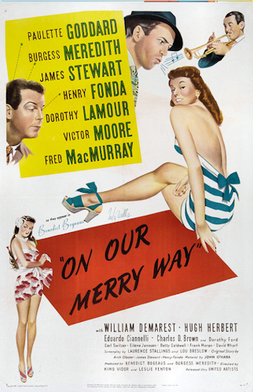
On Our Merry Way is a 1948 American comedy film produced by Benedict Bogeaus and Burgess Meredith and released by United Artists. At the time of its release, King Vidor and Leslie Fenton were credited with its direction, although the DVD lists John Huston and George Stevens, who assisted with one of the segments, as well. The screenplay by Laurence Stallings and Lou Breslow, based on an original story by Arch Oboler, is similar in style to that of Tales of Manhattan (1942), another anthology film made up of several vignettes linked by a single theme. The picture stars Paulette Goddard, Burgess Meredith, James Stewart, Henry Fonda, Harry James, Dorothy Lamour, Victor Moore and Fred MacMurray. It marks the first joint movie appearance of Stewart and Fonda, who play a pair of musicians in their section of the film.

"Closing Time" is the twelfth and penultimate episode of the sixth series of the British science fiction television programme Doctor Who, and was first broadcast on BBC One on 24 September 2011. It was written by Gareth Roberts and directed by Steve Hughes. It is a sequel to "The Lodger", an episode Roberts wrote for the previous series.

The Walking Target is a 1960 crime film directed by Edward L. Cahn and starring Joan Evans, Merry Anders, and Ronald Foster. The screenplay concerns an ex-con who, upon release from prison, sets out to retrieve the $260,000 he hid before he was arrested, and finds unexpected romance with the widow of his former partner in crime.

The Gambler Wore a Gun is a 1961 Western film. The film is an uncredited remake of about five different B-westerns of the 1930s and 1940s. Some plot elements are also taken from 1954 western The Lone Gun, which starred George Montgomery.

Police Dog Story is a 1961 American crime film directed by Edward L. Cahn and starring James Brown and Merry Anders.
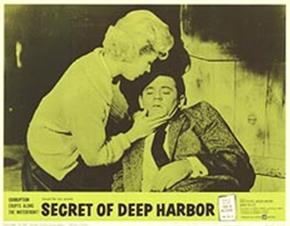
The Secret of Deep Harbor is a 1961 film directed by Edward L. Cahn, and starring Ron Foster and Merry Anders.
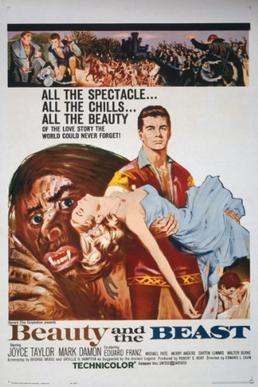
Beauty and the Beast is a 1962 American romantic fantasy film directed by Edward L. Cahn and starring Joyce Taylor and Mark Damon. It is based on the 18th century fairy tale Beauty and the Beast written by Jeanne-Marie Leprince de Beaumont and features title creature make-up by the legendary Jack Pierce.
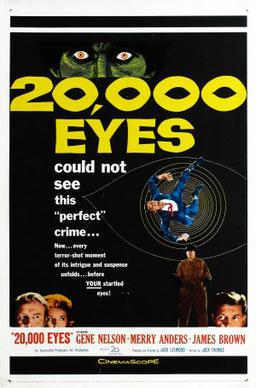
20,000 Eyes is a 1961 American drama film directed by Jack Leewood, written by Jack W. Thomas, and starring Gene Nelson, Merry Anders, James Brown, John Banner, Judith Rawlins and Robert Shayne.
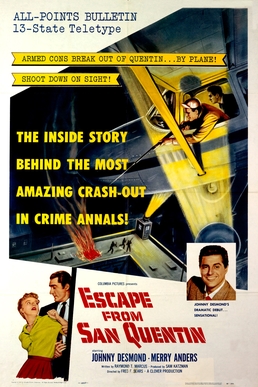
Escape from San Quentin is a 1957 American film noir crime film produced by Sam Katzman, directed by Fred F. Sears, and starring Johnny Desmond, Merry Anders and Richard Devon.

Calypso Heat Wave is a 1957 American drama musical film directed by Fred F. Sears and starring Johnny Desmond, Merry Anders and Meg Myles.

A Night Out is a 1961 Australian television play. It was based on A Night Out by Harold Pinter. It starred John Ewart and Richard Meikle.

Blueprint for Robbery is a 1961 American crime film directed by Jerry Hopper and written by Irwin Winehouse and A. Sanford Wolf. The film stars J. Pat O'Malley, Robert J. Wilke, Robert Gist, Romo Vincent, Jay Barney and Henry Corden. The film was released on February 1, 1961, by Paramount Pictures.



















